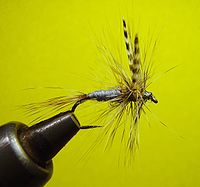

Fly tying. What could be better than catching a fish on a fly you made yourself?
The art of fly tying can be engrossing, you can forget about time and just get carried away thinking about what you saw from the river bank and how you can replicate it. The EquipmentThis is straight forward, what you need to get started are - a vise, at least one pair of Scissors, a couple of bobbin holders, a whip finishing tool, a pair of hackle pliers and a dubbing needle. The materialsThere are many different materials you can use to make up the flies. This includes items such as threads, yarns, furs, feathers, hair, tinsels, cork, balsa, wire, all sorts of natural and dyed furs, hair, pheasant, turkey, duck, goose and partridge feathers plus lots of synthetic materials.The hooksThe size and shape of each fly is controlled by the hook. The hook must be selected to complement the pattern, so careful consideration must be given to the size, shape, length, and weight so the fly does what it is supposed to do.The FliesLook in any serious fly fisherman's, who�s quarry is Trout, fly box and there are one or two flies that you are sure to find, even these flies you may find several different variations of it. These flies may be used for different conditions but we all feel a need to have them in our box, these flies may be simple in their look and design but they WORK and that is the thing that means we have them. What's their story?The AdamsThis is a fly that comes in many guises, for a lot of beginners to put the wings on is too difficult so they don�t, but it still works, it can be done in blue, brown or gray, and yes it still works. It is amusing to think that when this fly arrived in the UK from America that the established fly fishing community would not accept it. The Pheasant Tail NymphThere are loads of variations of this fly, and they all work. The variations are wide everything from some having legs, others being tied on long shanks, and others are done in fluorescent colours. Many fishermen will have a lot of variations in their box and they can all work at the same time of the year. The Black PennellThis simple yet effective fly is good for early season Trout that are feeding on midges. This fly is an easy one to tie and yet time after time it works well on the water.  Custom Search Back to Fly Tying Top Back to Fly Fishing Back to Home |























